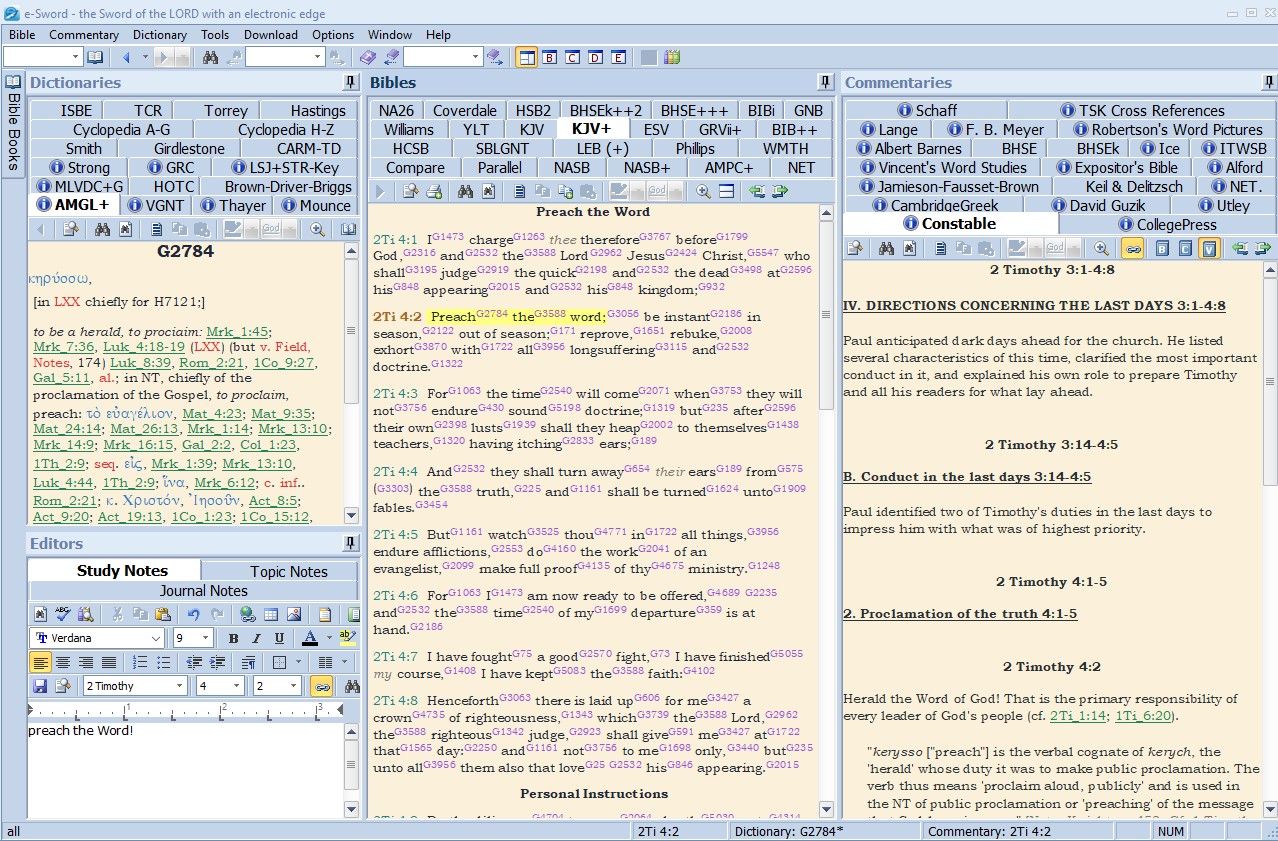As a growing Christian, you will be guided by the Holy Spirit to inquire into the Bible to learn about Who God is, what He has done for you in Redemption, and what He wants to accomplish in and through you. One of the primary reasons God has given us the Holy Spirit is so that He can guide us to understand the Bible, how Christ is revealed there, and how we can live Christlike lives (Jn. 14:16-17, 26; 16:13-15). In 2 Tim. 2:15, we are encouraged to be students of God’s Word, carefully sorting out and understanding the truths God has revealed to us. The Christian is challenged to be a serious student of the Bible. Psalm 1:3 tells us we need to be like a tree planted by a stream, being fed by putting down deep nourishing roots, and being fruitful as a result. You need to aim for a point in your life when you find that you can’t go a day without spending quality time with God and His Word. We must know the Word deeply in order to know Christ intimately.
In the context of those thoughts, this article is provided to encourage you to take advantage of the excellent resources available to you by technology. This overview will not include “Bible apps” which are oriented mostly to phones and serve as a replacement for your “real Bible”. There are places (like waiting rooms or riding the bus) where these apps are useful, but please keep your paper-based “real Bible” close by and well-used (hopefully a good Study Bible). Here we are going to point out a few good resources that you can trust biblically and find to be helpful resources for your study and understanding of Scripture.
Internet-based Resources
- One of the things you need to be careful about when going to the internet in your Bible study is that you need to be able to trust the sources and writers you go to. You will find many resources related to people or organizations you know and trust, but there will be others that are unfamiliar to you. Some will be good people, maybe you’ve heard of but don’t know, and are worth taking a look at. But for the unfamiliar, the best advice is that if you see an interesting search result that you don’t recognize, don’t even click it. At the most, make note of it and check with your Pastor or Bible teacher at church. This list is obviously short – the internet is expansive and can be frustrating when you’re “just trying to find the answer.”
- preceptaustin.org – This remarkably robust site is related to the Kay Arthur Bible Study ministry. The unique strength of this site is the in-depth material provided to guide you in understanding the biblical Inductive Bible Study method. This method adopts the standard Observe/Interpret/Apply approach, and is committed to the biblical hermeneutics, of requiring Normal/Literal/Historical consistency. This site provides a significant array of resources for every book of the Bible. There are also a broad array of ancillary sources such as Bible history and geography. You will probably never see everything there is on this site, but when you’re studying Romans 7 and look that up, you will have all you could hope for on the passage. The resources are compilations of older works written by famous Bible scholars and now in the public domain, along with other commentary works donated to the site.
- Bible.org – This site is related to Dallas Theological Seminary. The main content is a significant repository of sermon transcripts and other Bible study materials by respected Bible scholars. This a large resource, and the authors are all highly qualified Bible scholars committed to literal biblical hermeneutics.
- insight.org is related to content from Charles Swindoll and his Insight for Living ministry, a solid Bible teacher for the last fifty plus years.
- gty.org John MacArthur’s Grace to You ministry, including Master’s College. The site offers content from MacArthur and several faculty members from Master’s Seminary.
Computer Resources
- There are several computer applications (desktop or laptop) that are excellent resources for more concentrated Bible study. Internet-based apps vary in complexity and some provide the ability to dig and discover on your own as you develop proficiency and grow in Bible knowledge. On the other hand, “standalone” apps are locally installed on your computer and do not depend on the internet for information.
- There are several appealing Bible study software packages out there for the general Christian audience – Biblesoft, Accordance (Apple only, strong emphasis on languages), Olive Tree, BibleWorks (heavy emphasis on languages), and a few others. Lifeway also has a selection of offerings which have nice screen views but limited capabilities. All of these packages have a range of cost, they have a pleasant, modern interface, and each has some way of providing value for Bible study. However, none of them offer a broad range of resources out of the box (especially free), and they have a variety of limitations to their functionality.
- Logos – This is the “Cadillac” of Bible software. It is surprisingly expensive, especially if you opt for one of the higher level of feature packages. Although there is a free entry-level package, it only provides a small number of resources. You can easily spend thousands of dollars on Logos. I don’t recommend it unless you’re planning on being a seminary professor.
- E-Sword – This package has been available since 2000. It has always been free (which is amazing), although there is a way for you to make a donation to the group that supports the app. It is a very mature app which has a broad range of offerings. The interface is very simple, not fancy but efficient as shown here. All of the various resources are arranged in a group of frames in the main application window, and the resources are all linked to the Bibles you download. So whether you use the NAS, ESV, KJV, when you click on a verse, the app automatically shows a flag on every book that has information related to that verse. In several of the Bible versions (e.g. I use the NAS with Strong’s numbers included) you can click the word’s number and get multiple links in the various dictionaries. This means that you have the capability for unlimited Bible study within one screen on your computer! There is a download tool in the app which makes 100’s of various Bibles, commentaries and dictionaries easily obtainable (many free). And beyond that there is a separate, dedicated site – biblesupport.com – which has thousands of additional works available, many of them major works such as the Expositor’s Bible (also free). The app is clean without trying to be fancy, and it doesn’t break. Here is a view of the main screen with various resource installed and 2 Tim. 4:2 has been clicked on – note all the commentaries on the right which have material on that text , and note on the left the lexicon is showing the Greek information for the word “preach”.

When I consider other Bible study apps, with their limited resources, costs to get a few limited additional features and resources, I see no way to compare that to using e-Sword. I strongly recommend the everyday Christian choose e-Sword, whether he or she is just doing personal study, preparing to teach a Bible class or be involved in discipling a new Christian, even writing a book – there is no better tool… unless you can afford a few thousand dollars for a Cadillac!



